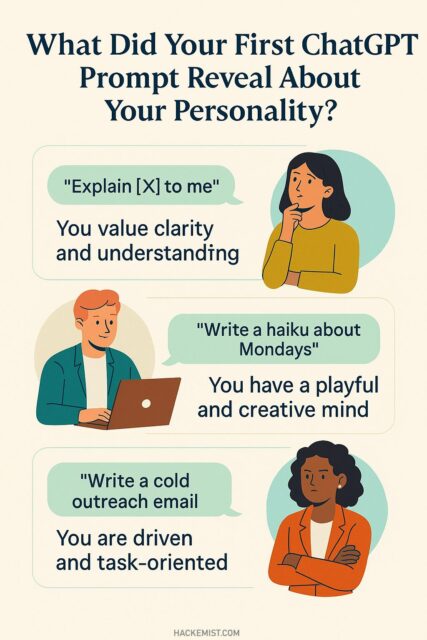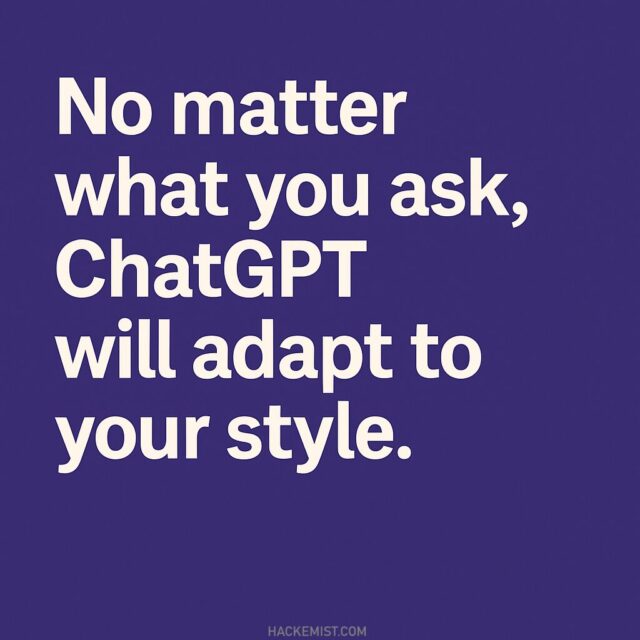There’s something strangely intimate about a blank chat window.
You sit there. Cursor blinking. This little AI box staring back at you, asking, “What would you like to talk about?” No judgment. No small talk. Just infinite possibility.
And yet, that first-ever prompt you typed—the one you barely thought about—probably says more about you than you realized.
I’ve asked dozens of people about theirs. Some went practical: “Write a business proposal for a pet grooming app.” Others leaned into curiosity: “Can you explain quantum mechanics like I’m five?” A few went right for the emotional jugular: “Why does my ex still show up in my dreams?”
And every time, I noticed something.
Your first ChatGPT prompt doesn’t just reflect what you wanted to know. It reflects how you think. How you manage uncertainty. What you trust—or don’t trust—about yourself. It’s a snapshot of your psychological wiring.
Let’s dig into this. Because behind that innocent question you asked a chatbot lies something much deeper: the truth about how your mind works when no one’s watching.
The Psychology of First Moves
In psychology, first moves are rarely random.
First questions on a first date. First pages in a journal. First things we Google at 3am. They all reveal subconscious themes—what we long for, what we fear, where we’re stuck.
Your first ChatGPT prompt is the same. It reflects your relationship with control, creativity, learning, even self-worth.
Study revealed that the type of question people ask first when interacting with AI correlates with core personality traits—including openness, neuroticism, and need for cognitive closure.
In short? What you ask says a lot about who you are.

1. If Your First Prompt Was: “Explain [X] to me” — You Value Clarity Over Performance
A lot of people started with something like:
- “Explain blockchain.”
- “How does ChatGPT work?”
- “What’s inflation in simple terms?”
This is the mark of someone who craves understanding over flair. You’re not trying to impress anyone—you just want to get it. Fast. Clear. Straightforward.
What this says about you:
You likely score high in intellect—a subtrait of openness. You enjoy learning for its own sake. You might also be a bit skeptical of authority and want to form your own mental models before adopting a belief.
Your hidden strength:
You’re curious in a humble way. You ask because you want to understand, not to sound smart.
Watch out for:
Perfection paralysis. You might delay decisions or actions until you feel you understand everything—which can keep you stuck.
2. If You Asked for a Poem, Story, or Creative Piece — You Have a Playful Mind (and You Might Be Testing Trust)
Some people immediately typed:
- “Write a haiku about Mondays.”
- “Tell me a bedtime story about a sad robot.”
- “Can you write a rap about my cat named Bingo?”
This is the sign of someone who approaches life with creativity and play. But it’s also sometimes a defense mechanism—testing the waters before going deeper.
What this says about you:
You’re high in imagination and probably scored high in creative thinking in school. But you also might use humor or abstraction as a shield. Instead of saying “I’m anxious,” you say, “What would it sound like if a toaster had an existential crisis?”
Your hidden strength:
You bring levity into tension. You make heavy topics approachable. You’re a connector of dots others miss.
Watch out for:
Avoiding vulnerability by staying in metaphor. Sometimes the real question is underneath the playful one.
3. If You Typed a Work Task — You Might Be Efficiency-Driven and Self-Pressuring
There’s a whole tribe whose first-ever prompt was some version of:
- “Write a cold outreach email to a potential client.”
- “Give me 10 content ideas for LinkedIn.”
- “Summarize this 5-page PDF.”
These people didn’t come to chat. They came to optimize.
What this says about you:
You likely score high in conscientiousness and are internally driven. You want tools to help you perform better—because deep down, you may associate worth with output.
Your hidden strength:
You’re a doer. You take action. You don’t just consume information—you use it.
Watch out for:
Equating productivity with peace. Sometimes, we ask AI to take tasks off our plate because we’re too exhausted to admit we’re burnt out.
4. If You Asked Something Deep or Personal — You’re Likely Introspective (and Braver Than You Think)
I’ve had people tell me their first prompt was:
- “How do I know if I’m in the right relationship?”
- “Why do I feel unmotivated all the time?”
- “What should I do if I hate my job?”
There’s a quiet courage in this. To come to a machine, of all things, with your raw questions.
What this says about you:
You’re self-aware and emotionally intelligent. You use tools—any tools—to make sense of what you’re feeling. You don’t pretend things are fine when they’re not.
Your hidden strength:
You’re reflective. You value emotional truth. You’re not afraid to dig for meaning.
Watch out for:
Confusing AI with a therapist. While AI can reflect your words back, it doesn’t know your history or your body cues. You still need real human support.
5. If You Said “Hi” or Asked What ChatGPT Could Do — You’re Probably Cautious and Open-Minded
Some people don’t rush in. They test the water.
Their first prompt was:
- “Hello.”
- “What can you do?”
- “How should I talk to you?”
This is the mark of someone who thinks before they leap. You’re curious, but also careful. You don’t want to break something—or be broken by it.
What this says about you:
You might be high in agreeableness and social sensitivity. You want to get along—even with machines. You may also be someone who needs context before committing.
Your hidden strength:
You listen. You observe. You approach the unfamiliar with respect.
Watch out for:
Delaying self-expression for fear of “doing it wrong.” You don’t need to be perfect. You just need to be real.
A Few More Interesting Patterns
🧠 People who opened with philosophical or existential prompts (e.g., “What’s the meaning of life?” or “Is consciousness real?”) often score high in trait openness and are more likely to question norms.
🛠️ People who opened with tool-use prompts (e.g., “Can you build me a schedule?” or “Write a resume for me”) tend to be high in strategic thinking but low in trust—they want help but don’t fully believe others will give it.
🌀 People whose first prompt was “How are you?” often treat everything—even AI—as relational. These are the same people who talk to baristas, mail carriers, and stray cats. In the best way.
What You Can Learn From Your First Prompt
So… what did you ask first?
Go back if you can. Scroll through. Find that first question.
Then ask:
- What was I hoping for?
- What was I afraid of?
- What kind of thinker—or feeler—was I being in that moment?
Because here’s the thing: your first question isn’t a fluke. It’s a breadcrumb. A trail back to the kind of person you are when no one’s watching. When you’re not trying to impress or perform. When you’re just trying to understand something.
And in that quiet space between a blinking cursor and an honest question… that’s where your personality shows up most clearly.
Final Thought
In a world where we’re always presenting polished versions of ourselves, your first ChatGPT prompt is a rare artifact. It wasn’t edited. It wasn’t curated. It was you, raw and curious and just trying to get a straight answer from something that didn’t have an ego.
So don’t brush it off.
Look at it again. Learn from it. And maybe, ask yourself the question beneath the question.
You might be surprised what it tells you.

